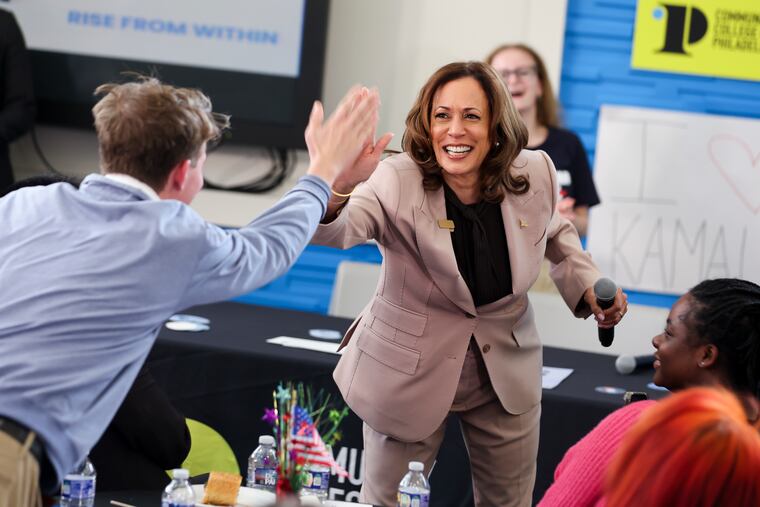How Pa.’s undecided voters are processing their decision with just weeks until the election
Pa.’s undecided voters say they want to know more about Kamala Harris as they decided between VP and former President Donald Trump.

Paul Johnson voted for Donald Trump in 2016 but thought he botched his first term, so Johnson voted for Joe Biden in 2020.
Now the retired contractor from West Oak Lane isn’t sure what to do in the race between Trump and Vice President Kamala Harris.
“I don’t think America’s ready for Kamala,” Johnson, 62, said. “And I think we had enough of dealing with Trump but if we had a choice right now, we might have to give Trump a chance. He was president once and … did a crappy job, but for me, I don’t think Kamala can handle the diplomatic part of being president.”
Johnson is one of a small but powerful group of undecided voters in Pennsylvania who say they plan to vote in the race but have yet to make up their minds.
About 4% of likely voters in the state are undecided, according to a recent Philadelphia Inquirer/New York Times/Siena College poll. That’s the same number of undecideds that a similar Pennsylvania survey found in August. When third-party options are considered, about 2% of voters are unsure.
Pennsylvania is a highly coveted swing state that was won by a little more than one percentage point in 2020 and a little less than one percentage point in 2016. It’s increasingly looking crucial to Harris’ chances of winning the presidency and Trump’s path toward blocking her and securing another term.
While the vast majority of voters know who they’re supporting, the race could come down to a conflicted few who for reasons often personal, ideological, or specific to their own circumstances, are torn between two vastly different visions for the country, leaning toward a third-party candidate, or unsure whether they’ll vote at all.
In Pennsylvania, the small group of undecided voters is evenly split across all ages, gender, and geography. The majority are independent voters and the group is slightly higher represented by nonwhite voters without college degrees, though the sample size — about 40 people in a survey of 1,000 — is extremely small.
Johnson has concerns about how Harris, who would be the first woman to lead the United States, would be received internationally.
“She was vice president but she didn’t wield a lot of power. You got people like Putin and Kim Jong Un, and they don’t respect women, let alone a Black woman,” said Johnson, who is Black. “We need someone strong. Attorney general is one thing but running the country is a whole other.”
Another debate would help him decide, Johnson said, though Trump has said his first and only debate with Harris will be his last.
“She needs to show herself more, stop telling these stories about how she’s gonna stop shrinkflation. I want to know more about Kamala,” he said.
Johnson isn’t alone in that desire. About a quarter of Pennsylvania voters said they want to know more about Harris, who has been vice president for nearly four years but only the party’s nominee since Aug. 6.
While Johnson teeters between both candidates, Daniele Fedonni, a 34-year-old biostatistician, from South Philadelphia, is a progressive voter feeling left behind by Harris’ more moderate stances, particularly what he considers a weak response to atrocities in Gaza.
“She’s pro-fracking, she’s anti-Medicare for all … she’s running on building a wall — one of the most disgusting policies from Trump that all the Democrats were once against,” Fedonni said. “She’s talking about funding all cops, while they’re shooting people over fare evasion in New York.”
Fedonni said he feels like “lesser of two evils,” is a false equivalency and he’s considering not voting in the presidential race.
For Kayla Mann, her conflict is whether to vote for Harris or sit out entirely during a traumatic year for her family. Mann and her 11-year-old son were living with her grandmother until the family matriarch died last year and they wound up homeless. They’re currently living in a shelter in North Philadelphia as Mann tries to save up by working at another shelter for people with disabilities.
“The statement that Kamala made during her debate where she was saying she’d rather build up the middle class, well, why are there so many people in poverty right now?” Mann, 27, said. “Why are there so many people who can’t afford to stay in their homes? … Some people can’t finish school, so I feel like just catering toward the middle class, what about the working class?”
Mann, whose dream job is to become a veterinary tech or vet assistant, has been trying to get into a program to study X-ray tech or medical assistance but juggling childcare and work has made that difficult.
As a sexual assault survivor, she said she feels strongly about women’s reproductive rights which she thinks Harris would fight to protect.
But Mann said she’s uneasy about Harris’ background in law enforcement and had concerns that Harris might shield cops who abuse their power. (Harris coauthored the George Floyd Justice In Policing Act, which included provisions that would have lowered the standard of proof in police misconduct cases and limited qualified immunity for cops.)
“It’s sad that I have to talk to my son about certain things and certain actions when he goes out into the world,” Mann said. “He’s only 11.”
Ultimately, she said she also wants to see more of the Democratic nominee.
“I want to just hear her say, ‘Look, we’re all in this together. Everybody needs to come together — and I see you.’ I think then I might be more geared toward Kamala. Maybe.”